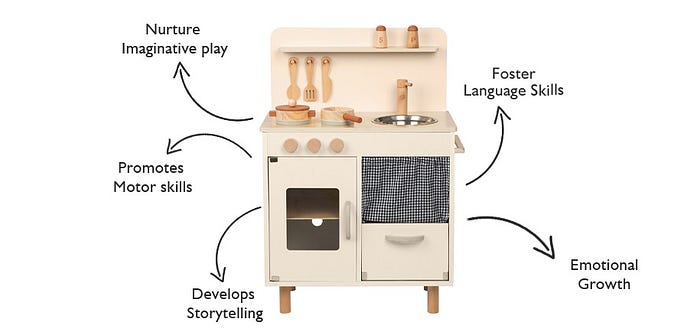8 Benefits of Play Kitchen for Children
Play kitchens are a great way to encourage little ones to play different roles and give them the freedom to explore imaginative scenarios in a fun way.
Read on to discover some of the great benefits that using play kitchens can have for your children.
Creativity and imagination
By using a play kitchen set, children can inspire their imagination. Perhaps they will play the role of a Michelin-starred chef for the day, host a dinner party for friends, or hold a cooking competition. In their own home, children can experiment and express their creativity by playing different roles in the play kitchen.
Fine Motor Skills
Fine motor skills include making movements using small muscles in the wrists and hands. A play kitchen set is also a wonderful way to encourage the development of fine motor skills.
Children can use dials to pretend to turn up the heat on the oven and open the cupboard doors. With the Bakehouse Traditional Wooden Kitchen with Fridge, they can even operate the imitation ice dispenser, all of which can help children to develop their skills whilst playing.
Visual Recognition
Recognising objects is something a child learns as they grow. In the play kitchen, kids can learn to recognise lots of things, from foods to utensils. There are lots of features in play kitchens that kids will love and learn to recognise. The Penne Pantry Wooden Corner Kitchen with Fridge, with its sky-blue features, play kitchen utensils, and baskets, provides an appealing setting for children to learn to recognise kitchen items.
Numeracy
Pretending in the play kitchen is a great way to get children to practice numeracy while they play. Perhaps children can count how many vegetables they need to make a dish or see what time dinner’s ready? You can count on a play kitchen to provide lots of fun ways to bring numeracy into play.
Planning and organisation
Planning and organising are important skills that children learn that help them improve their time management and prioritisation. The play kitchen offers many scenarios that help kids develop these skills. For example, they can plan how long a meal will take to cook, arrange who will sit where at the breakfsat table, and decide who will wash up afterwards.
Social Skills
Social skills are significant as they allow children to communicate with others and build positive relationships. In the play kitchen, children can communicate with each other about what they’re cooking, help one another collect utensils, and work together to prepare a dish. All these activities contribute positively to the development of children's social skills while they play.
Teamwork
Working together in the play kitchen means that children can create a sense of teamwork. Perhaps they need to take turns chopping up fruit or mixing the ingredients? Maybe they need to share the workspace or take it in turns to use the light-up cooking stove? Whatever the scenario, playing it this way helps children bond, work together, and share.
Language and communication
Children can practice communicating with each other about what needs to be done in the kitchen—stocking up the fridge or pretending to put a load of laundry on to wash. Children can chat about cooking and cleaning while they play, which can help broaden their language and communication skills too.
There are lots of benefits of play kitchens for children. So, why not bring imaginative play to life with a traditional play kitchen? Explore more here.
Source: https://barnshenn.medium.com/8-benefits-of-play-kitchen-for-children-9a7adc14bb95




Comments
Post a Comment